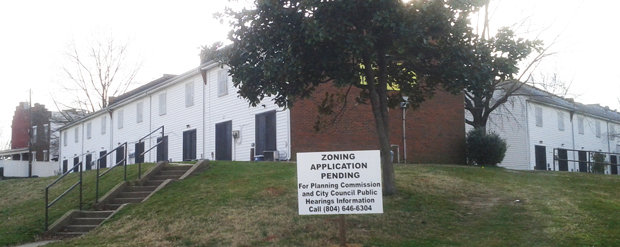
Vinyl is so out.
Genesis Homes is planning a three-story apartment complex in the Union Hill district, just north of Church Hill, but developer Ron Hunt needs City Council to approve a rezoning permit.
He got conditional approval through the planning commission this month after agreeing to the city’s conditions, which included that he not use vinyl siding.
Genesis purchased the 104,000-square-foor parcel in early 2007 for $1.5 million, according to the Richmond assessor’s office.
“We had planned to do this back in [2007], but then the economy went bust, so we had to wait,” Hunt said. “We’ve just been managing the properties since then.”
Hunt said he secured financing assurances from the Virginia Housing Development Association but would not say how much the 150-unit project would cost.
The planning commission approved the rezoning on the condition that a new building would have, among other things, trees, bike racks, a minimum of 635 square feet per unit and no vinyl siding.
Hunt said that, assuming the City Council approves the rezoning permit, he hopes to break ground within 60 days.
The permit would essentially change the density on the parcel from a maximum of 35 units per acre to 43 units per acre, according to city documents.
Genesis is the developer and property manager, and Walter Parks is the architect. The final design should be finished this week, Hunt said.
Hunt has not decided on a general contractor.
The 58 townhouses on site are occupied but have relocation clauses in the leases, so Genesis will pay for the costs, he said.
Vinyl is so out.
Genesis Homes is planning a three-story apartment complex in the Union Hill district, just north of Church Hill, but developer Ron Hunt needs City Council to approve a rezoning permit.
He got conditional approval through the planning commission this month after agreeing to the city’s conditions, which included that he not use vinyl siding.
Genesis purchased the 104,000-square-foor parcel in early 2007 for $1.5 million, according to the Richmond assessor’s office.
“We had planned to do this back in [2007], but then the economy went bust, so we had to wait,” Hunt said. “We’ve just been managing the properties since then.”
Hunt said he secured financing assurances from the Virginia Housing Development Association but would not say how much the 150-unit project would cost.
The planning commission approved the rezoning on the condition that a new building would have, among other things, trees, bike racks, a minimum of 635 square feet per unit and no vinyl siding.
Hunt said that, assuming the City Council approves the rezoning permit, he hopes to break ground within 60 days.
The permit would essentially change the density on the parcel from a maximum of 35 units per acre to 43 units per acre, according to city documents.
Genesis is the developer and property manager, and Walter Parks is the architect. The final design should be finished this week, Hunt said.
Hunt has not decided on a general contractor.
The 58 townhouses on site are occupied but have relocation clauses in the leases, so Genesis will pay for the costs, he said.



Sorry, but the facts are a little out of sync in this story. The city is simply restating a proffer that was negotiated between Hunt and neighboring property owners in the Union Hill City Old and Historic District. Technically, the city doesn’t have an aesthetic or architectural opinion on the use of vinyl siding for this property. The City Planning Commission simply is affirming the request of neighboring citizens who by law had the opportunity to support or oppose Hunt’s request to re-zone the property from R53 to R63. “No vinyl siding” is just one of the proffers Hunt agreed… Read more »
Great news. They should use thin brick panels from Owensboro Brick. They’re genuine fired clay brick but only 1/2″ thick and pre-mounted on cement board. They go up fast and look like a million bucks.
This would be an alarming story if we were talking about more than vinyl siding and bike racks. The stipulations the city put forward seem to be more about ensuring that the development be pedestrian friendly and hold up over time more than conform to some bureaucrat’s style.
Elaine… the city’s proffers work just like every other jurisdiction’s proffers — as an order. Proffers by law are supposed to be voluntary but everyone in the construction business knows they are not. If Hunt had refused the request for no vinyl siding the city would reject the project and you know it. They are part of why housing in Richmond is so out-of-balance expensive and why Richmond can’t get the growth that other cities of similar size and characteristics get.
james: the rent is too high.
elaine: it’s ok if you must pay a little more to have it be nice.
i agree with elaine.
The biggest factor in the price of housing is the supply of build-able lots, so allowing more building in exchange for requiring the developers to spend a little more on the exterior could actually make housing more affordable. Also, in the long run, vinyl siding (which gets ragged after about 25 years and is more expensive to insure) costs at least as much as something more permanent.